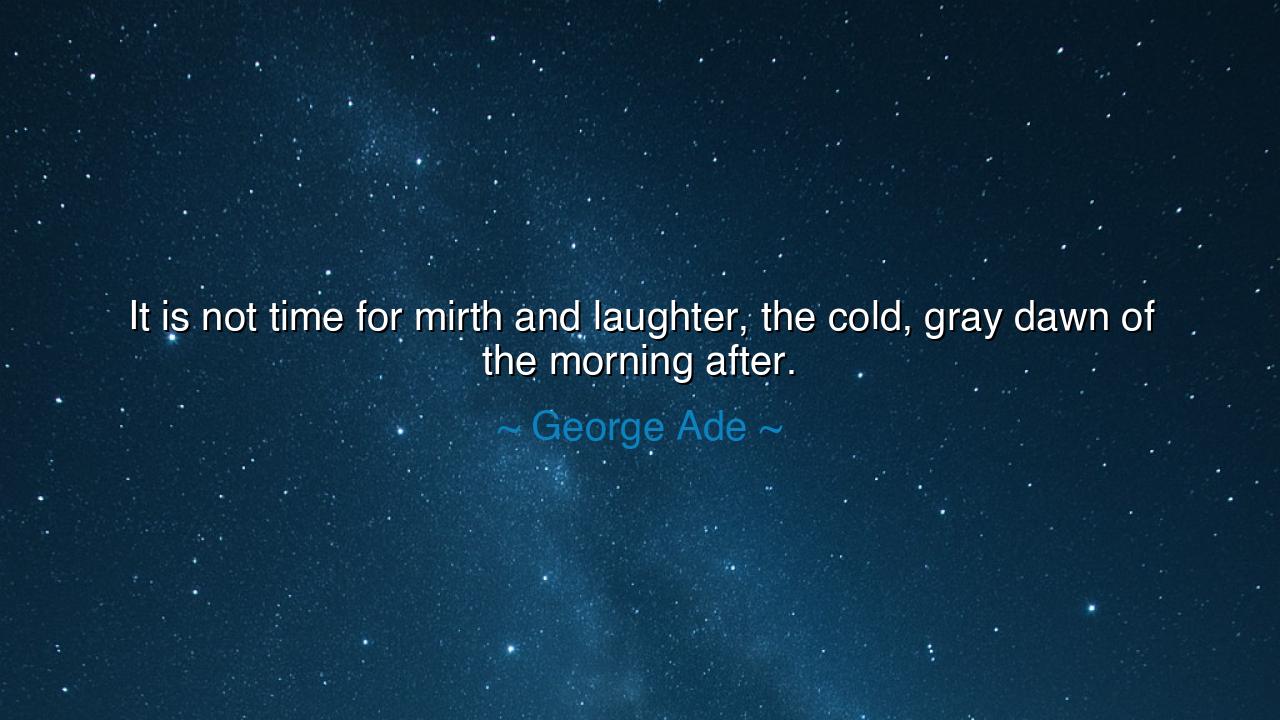
It is not time for mirth and laughter, the cold, gray dawn of






In the words of George Ade, “It is not time for mirth and laughter, the cold, gray dawn of the morning after.” At first, this line appears as a warning against the excesses of revelry, but within it lies a timeless truth about consequence, responsibility, and the sobering hand of reality. Ade, known for his wit and moral fables, captured here the moment when joy gives way to reckoning, when the warm fire of indulgence is quenched by the chill of dawn. His words remind us that every act carries its shadow, and that the sweetness of the night often leads to the bitterness of the morning.
The heart of this saying is the eternal rhythm of cause and effect. In the moment of mirth, men and women often forget the cost, abandoning restraint to drink deeply of pleasure. Yet the morning after arrives without fail, stripping away illusions, exposing weakness, and demanding payment for the choices made in haste. This is not only about feasts and drink, but about every indulgence of life—every decision made without thought of tomorrow. Ade’s wisdom is therefore universal: joy without foresight leads to the grayness of regret.
The ancients knew this truth well. The Greeks told the tale of Icarus, who, in the ecstasy of flight, soared too near the sun, only to fall into the sea. In his ascent was mirth and laughter, but the morning after was his doom. So too did the Romans warn of the Saturnalia, a festival of indulgence that often left the city in disarray once the fires had burned out. Ade’s words echo these warnings: that unchecked joy, without discipline, leaves the soul vulnerable to sorrow.
History too bears witness. Consider the Roaring Twenties, an age of jazz, excess, and reckless abandon. The nights were filled with laughter, prosperity seemed endless, and the world danced. Yet the cold dawn arrived in 1929, when the markets collapsed, and the Great Depression spread its gray shadow across the globe. The revels of one age gave way to the reckoning of the next, a living testament to Ade’s observation that the morning after spares no one.
Yet the quote is not only a warning, but also a call to wisdom. Ade does not condemn mirth itself, for laughter has its place and joy is a gift. Rather, he reminds us that joy must be tempered with foresight, that celebration must be balanced with responsibility. True wisdom is not in rejecting pleasure, but in remembering that tomorrow must always be faced. To laugh wisely is to know when to stop, to drink deeply of joy but not drown in its cup.
The emotional power of Ade’s words lies in their imagery: the cold, gray dawn. It is a picture of awakening, of a soul stripped bare, standing face to face with consequence. It is in this moment that men and women must reckon with themselves, asking not whether joy was sweet, but whether it was worth the price. This gray dawn is a teacher, harsh but necessary, for it leads the wise to moderation, balance, and foresight.
So, O listener, take this teaching to heart: rejoice, but rejoice with wisdom. Do not chase mirth so blindly that the morning after finds you broken and unprepared. Live in such a way that when dawn arrives, it does not bring regret, but peace. Let laughter be pure, let joy be measured, and let every night of celebration be followed not by sorrow, but by strength renewed.
For in the end, the lesson of George Ade is clear: life is not only about the night of laughter, but also about the dawn that follows. To live wisely is to embrace both—to celebrate when it is time to celebrate, and to prepare for the morning that always comes.






AAdministratorAdministrator
Welcome, honored guests. Please leave a comment, we will respond soon